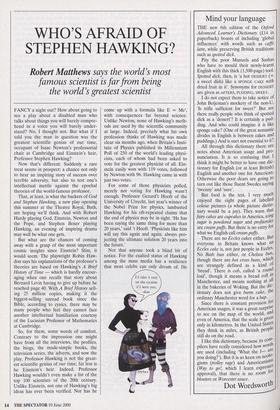Mind your language
THE new 6th edition of the Oxford Advanced Learner's Dictionary (£14 in paperback) boasts of including 'global influences' with words such as caffe latte, while preserving British traditions such as spotted dick.
Pity the poor Manuels and Sashas who have to mould their newly-learnt English with this thick (1,500-page) tool. Spotted dick, then, is 'a hot DESSERT (= a sweet dish) like a SPONGE CAKE with dried fruit in it'. Synonyms for DESSERT are given as AFIERS, PUDDING, SWEET. I do not expect them to take notice of John Betjeman's mockery of the non-U, `Is trifle sufficient for sweet?' But are there really people who think of spotted dick as a 'dessert'? It is certainly a pud- ding. And who could imagine it is like sponge cake? (One of the great semantic divides in English is between cakes and puddings.) And is suet not essential to it? All through this dictionary there are notes about American usage and pro- nunciation. It is so confusing that I think it might be better to have one dic- tionary for English (or at least British) English and another one for American. Otherwise the poor dears are going to turn out like those fluent Swedes saying `twenny' and 'sure'. But food is the test. I very much enjoyed the eight pages of labelled colour pictures (a whole picture dictio- nary would be a joy). They warn that fairy cakes are cupcakes in America, icing sugar is powdered sugar and profiteroles are cream puffs. But there is no entry fot what we English call cream puffs. There are no Eccles cakes either. But everyone in Britain knows what an Eccles cake is, not just people in Eccles. No Bath bun either, or Chelsea bun, though there are hot cross buns, which are strangely defined as a kind of `bread'. There is cob, called 'a round loaf, though it means a bread roll 01 Manchester, and means nothing at all in the bakeries of Woking. But the dic- tionary does not give barm cake, the ordinary Manchester word for a bap. Since there is constant provision f,01. American usages, it was a great surPrle, to see on the map of the world, and even of America, that the scale is given only in kilometres. In the United States they think in miles, as British people still do on the road.
I like this dictionary, because its cool' pilers have really considered how words are used (including 'What the f— are you doing?'). But it is so keen on neolo- gisms (trolley rage) and Americanisms (Way to go!, which I learn expresses_ approval), that there is no room feir bloaters or Worcester sauce.
Dot Wordsworth
































































 Previous page
Previous page